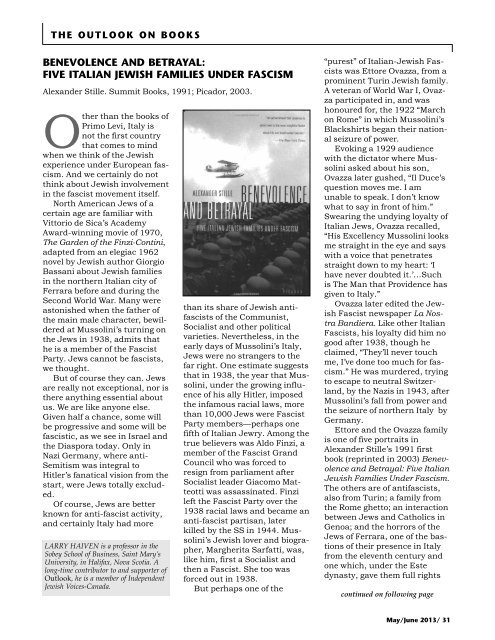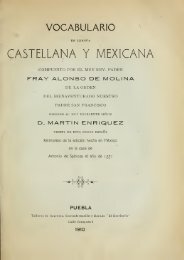Benevolence and Betrayal: Five Italian Jewish Families Under ...
Benevolence and Betrayal: Five Italian Jewish Families Under ...
Benevolence and Betrayal: Five Italian Jewish Families Under ...
Create successful ePaper yourself
Turn your PDF publications into a flip-book with our unique Google optimized e-Paper software.
THE OUTLOOK ON BOOKS<br />
BENEVOLENCE AND BETRAYAL:<br />
FIVE ITALIAN JEWISH FAMILIES UNDER FASCISM<br />
Alex<strong>and</strong>er Stille. Summit Books, 1991; Picador, 2003.<br />
Other than the books of<br />
Primo Levi, Italy is<br />
not the first country<br />
that comes to mind<br />
when we think of the <strong>Jewish</strong><br />
experience under European fascism.<br />
And we certainly do not<br />
think about <strong>Jewish</strong> involvement<br />
in the fascist movement itself.<br />
North American Jews of a<br />
certain age are familiar with<br />
Vittorio de Sica’s Academy<br />
Award-winning movie of 1970,<br />
The Garden of the Finzi-Contini,<br />
adapted from an elegiac 1962<br />
novel by <strong>Jewish</strong> author Giorgio<br />
Bassani about <strong>Jewish</strong> families<br />
in the northern <strong>Italian</strong> city of<br />
Ferrara before <strong>and</strong> during the<br />
Second World War. Many were<br />
astonished when the father of<br />
the main male character, bewildered<br />
at Mussolini’s turning on<br />
the Jews in 1938, admits that<br />
he is a member of the Fascist<br />
Party. Jews cannot be fascists,<br />
we thought.<br />
But of course they can. Jews<br />
are really not exceptional, nor is<br />
there anything essential about<br />
us. We are like anyone else.<br />
Given half a chance, some will<br />
be progressive <strong>and</strong> some will be<br />
fascistic, as we see in Israel <strong>and</strong><br />
the Diaspora today. Only in<br />
Nazi Germany, where anti-<br />
Semitism was integral to<br />
Hitler’s fanatical vision from the<br />
start, were Jews totally excluded.<br />
Of course, Jews are better<br />
known for anti-fascist activity,<br />
<strong>and</strong> certainly Italy had more<br />
LARRY HAIVEN is a professor in the<br />
Sobey School of Business, Saint Mary’s<br />
University, in Halifax, Nova Scotia. A<br />
long-time contributor to <strong>and</strong> supporter of<br />
Outlook, he is a member of Independent<br />
<strong>Jewish</strong> Voices-Canada.<br />
than its share of <strong>Jewish</strong> antifascists<br />
of the Communist,<br />
Socialist <strong>and</strong> other political<br />
varieties. Nevertheless, in the<br />
early days of Mussolini’s Italy,<br />
Jews were no strangers to the<br />
far right. One estimate suggests<br />
that in 1938, the year that Mussolini,<br />
under the growing influence<br />
of his ally Hitler, imposed<br />
the infamous racial laws, more<br />
than 10,000 Jews were Fascist<br />
Party members—perhaps one<br />
fifth of <strong>Italian</strong> Jewry. Among the<br />
true believers was Aldo Finzi, a<br />
member of the Fascist Gr<strong>and</strong><br />
Council who was forced to<br />
resign from parliament after<br />
Socialist leader Giacomo Matteotti<br />
was assassinated. Finzi<br />
left the Fascist Party over the<br />
1938 racial laws <strong>and</strong> became an<br />
anti-fascist partisan, later<br />
killed by the SS in 1944. Mussolini’s<br />
<strong>Jewish</strong> lover <strong>and</strong> biographer,<br />
Margherita Sarfatti, was,<br />
like him, first a Socialist <strong>and</strong><br />
then a Fascist. She too was<br />
forced out in 1938.<br />
But perhaps one of the<br />
“purest” of <strong>Italian</strong>-<strong>Jewish</strong> Fascists<br />
was Ettore Ovazza, from a<br />
prominent Turin <strong>Jewish</strong> family.<br />
A veteran of World War I, Ovazza<br />
participated in, <strong>and</strong> was<br />
honoured for, the 1922 “March<br />
on Rome” in which Mussolini’s<br />
Blackshirts began their national<br />
seizure of power.<br />
Evoking a 1929 audience<br />
with the dictator where Mussolini<br />
asked about his son,<br />
Ovazza later gushed, “Il Duce’s<br />
question moves me. I am<br />
unable to speak. I don’t know<br />
what to say in front of him.”<br />
Swearing the undying loyalty of<br />
<strong>Italian</strong> Jews, Ovazza recalled,<br />
“His Excellency Mussolini looks<br />
me straight in the eye <strong>and</strong> says<br />
with a voice that penetrates<br />
straight down to my heart: ‘I<br />
have never doubted it.’…Such<br />
is The Man that Providence has<br />
given to Italy.”<br />
Ovazza later edited the <strong>Jewish</strong><br />
Fascist newspaper La Nostra<br />
B<strong>and</strong>iera. Like other <strong>Italian</strong><br />
Fascists, his loyalty did him no<br />
good after 1938, though he<br />
claimed, “They’ll never touch<br />
me, I’ve done too much for fascism.”<br />
He was murdered, trying<br />
to escape to neutral Switzerl<strong>and</strong>,<br />
by the Nazis in 1943, after<br />
Mussolini’s fall from power <strong>and</strong><br />
the seizure of northern Italy by<br />
Germany.<br />
Ettore <strong>and</strong> the Ovazza family<br />
is one of five portraits in<br />
Alex<strong>and</strong>er Stille’s 1991 first<br />
book (reprinted in 2003) <strong>Benevolence</strong><br />
<strong>and</strong> <strong>Betrayal</strong>: <strong>Five</strong> <strong>Italian</strong><br />
<strong>Jewish</strong> <strong>Families</strong> <strong>Under</strong> Fascism.<br />
The others are of antifascists,<br />
also from Turin; a family from<br />
the Rome ghetto; an interaction<br />
between Jews <strong>and</strong> Catholics in<br />
Genoa; <strong>and</strong> the horrors of the<br />
Jews of Ferrara, one of the bastions<br />
of their presence in Italy<br />
from the eleventh century <strong>and</strong><br />
one which, under the Este<br />
dynasty, gave them full rights<br />
continued on following page<br />
May/June 2013/ 31
THE OUTLOOK ON BOOKS<br />
long before the rest of Italy<br />
(though this was removed when<br />
the Vatican <strong>and</strong> the Inquisition<br />
took over in 1597.) While the<br />
stories of <strong>Jewish</strong> fascists are<br />
the most striking <strong>and</strong> unexpected,<br />
several chapters deal with<br />
<strong>Italian</strong> Jews who fought Mussolini<br />
even before he took political<br />
power in 1922, <strong>and</strong> certainly<br />
before he allied his country with<br />
Nazi Germany.<br />
The word “ghetto” is in fact of<br />
<strong>Italian</strong> origin. And even the<br />
enlightened <strong>Italian</strong>s of the<br />
Renaissance were prone to<br />
attack the Jews. During a tour<br />
of the mountain city of Trento,<br />
our guide pointed out a wall<br />
plaque in a main street portraying<br />
a little boy being savaged by<br />
men in beards. The plaque<br />
commemorates “Little Simon”<br />
(Simonino), a two-year-old<br />
Christian boy (later canonized)<br />
whose death in 1475 was<br />
attributed to ritual murder (the<br />
so-called “blood libel”) by the<br />
city’s Jews. Subjected to torture,<br />
fifteen of them were burnt<br />
at the stake <strong>and</strong> the rest<br />
expelled, an act not repealed<br />
until 1965.<br />
The rehabilitation in Trento<br />
came over 100 years after<br />
emancipation in the rest of the<br />
country. The Ferrara ghetto disappeared<br />
in 1859 <strong>and</strong> the Jews<br />
once again prospered, as generally<br />
did their co-religionists<br />
throughout the country until<br />
1938.<br />
Stille’s book is not new, but<br />
one that needs to be read more<br />
widely outside of Italy. I discovered<br />
it only recently after<br />
spending considerable time in<br />
northern Italy <strong>and</strong> meeting the<br />
author. Alex<strong>and</strong>er Stille, himself<br />
of <strong>Jewish</strong> background, was<br />
born in the U.S. but is the son<br />
of Ugo Stille, the former editor<br />
of the major <strong>Italian</strong> newspaper<br />
Corriere della Sera. I became<br />
interested in Stille after reading<br />
32 / Outlook<br />
his very accessible <strong>and</strong> thorough<br />
exposé The Sack of Rome:<br />
How a Beautiful European<br />
Country with a Fabled History<br />
<strong>and</strong> a Storied Culture Was Taken<br />
Over by a Man Named Silvio<br />
Berlusconi (2006). He is also<br />
author of Excellent Cadavers:<br />
The Mafia <strong>and</strong> the Death of the<br />
First <strong>Italian</strong> Republic (1995).<br />
Stille is a professor at the<br />
Jews are not exceptional,<br />
nor is there anything<br />
essential about us.<br />
Given half a chance,<br />
some will be progressive<br />
<strong>and</strong> some will<br />
be fascistic.<br />
Columbia School of Journalism<br />
<strong>and</strong> writes for The New York<br />
Review of Books, The New York<br />
Times <strong>and</strong> The New Yorker.<br />
Focusing on five stories,<br />
Stille is able to personalize a<br />
complex history, not only of<br />
Jews under Fascism, but of<br />
Jews in <strong>Italian</strong> history. Many<br />
were originally exiles from the<br />
Spanish expulsion of 1492.<br />
Ironically, they were treated<br />
with respect in the South, but<br />
came under greater segregation<br />
in northern cities, <strong>and</strong> all suffered<br />
on the roller-coaster ride<br />
of the Popes’ <strong>and</strong> the Catholic<br />
Church’s changing attitudes.<br />
This continued until the<br />
Napoleonic invasion <strong>and</strong> their<br />
emancipation (save for a short<br />
revanchement before the revolutions<br />
of 1848). Italy had one<br />
of the world’s first unconverted<br />
<strong>Jewish</strong> heads of government in<br />
1910, <strong>and</strong> Rome had a <strong>Jewish</strong><br />
mayor from 1907 to 1913. And<br />
even in hindsight, <strong>Italian</strong> Jews<br />
escaped the worse depredations<br />
of the Holocaust until almost<br />
before the Allies liberated the<br />
country.<br />
But the temporary escape of<br />
<strong>Italian</strong> Jews from the gas chambers<br />
was only a small mercy.<br />
One of the most heart-rending<br />
stories in the book is that of the<br />
Jews of Rome. Gathered around<br />
one of the finest synagogues in<br />
Europe, on the banks of the<br />
Tiber, close to famous Roman<br />
ruins, the ghetto was not<br />
allowed to exp<strong>and</strong> while the city<br />
grew around it, <strong>and</strong> by the 20 th<br />
century housed over 5,000 people<br />
in seven <strong>and</strong> a half acres<br />
(around 3 hectares, or one<br />
tenth the size of the Vatican<br />
City). Says Stille, “While most<br />
Jews in northern Italy were cosmopolitan,<br />
highly assimilated<br />
<strong>and</strong> far from religious Orthodoxy,<br />
the Jews of the Rome<br />
ghetto were barely literate,<br />
deeply religious <strong>and</strong> powerfully<br />
linked to the life <strong>and</strong> traditions<br />
of their community.” Even<br />
today, Romans talk about the<br />
cruel trick played by the Nazis<br />
in inviting the Jews in October<br />
1943 to save their lives with a<br />
ransom of 50 kilograms of gold.<br />
Despite paying the ransom, the<br />
Jews were deported, joining<br />
7,500 of their coreligionist compatriots<br />
in extermination, even<br />
as the Allies fought their way up<br />
the <strong>Italian</strong> peninsula.<br />
To the end, the Roman Jews<br />
believed in <strong>Italian</strong> exceptionalism.<br />
In the words of one of them<br />
quoted by Stille, they:<br />
…felt the approach of terrible<br />
events, <strong>and</strong> yet because their<br />
own consciences were clear,<br />
supported by that high sense of<br />
civilization that comes from<br />
having grown up in our beautiful<br />
Italy, mother of morality <strong>and</strong><br />
law that from eternal Rome has<br />
illuminated the whole world,<br />
they refused to believe that the<br />
thugs of Hitler would dare<br />
repeat the incredible barbarities<br />
they had committed in<br />
Pol<strong>and</strong>, Germany, Holl<strong>and</strong> <strong>and</strong><br />
Belgium. Vain illusion!◆






